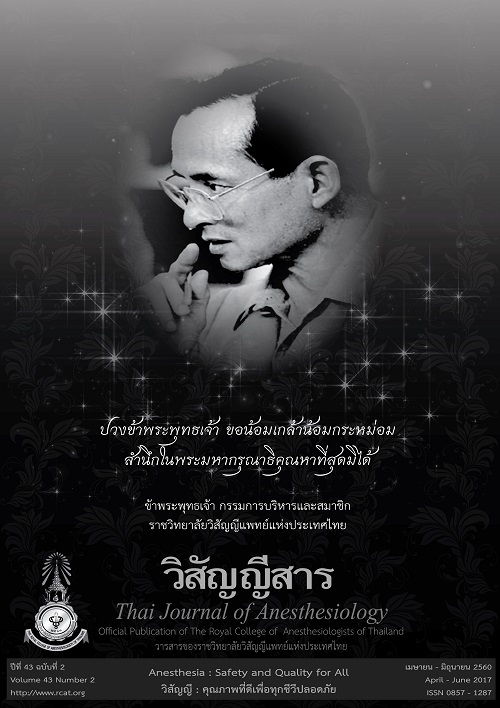A randomized controlled comparison of difference heart rate after the reversal of non-depolarized muscle relaxant with atropine 0.6 mg, 0.9 mg and 1.2 mg plus neostigmine 2.5 mg
Main Article Content
Abstract
Background: At the end of general anesthesia,
reverse effect of muscle relaxant by using anticholinesterase
agents is recommended. To minimize
muscarinic effect from neostigmine, atropine up to
1.2 mg is preferred in most cases. Anyway some
dangerous tachyarrhythmias may be occurred.
Objective: To compare difference in heart rate and
complication after the reversal of non-depolarized
muscle relaxant using atropine 0.6 mg, 0.9 mg and
1.2 mg combined with 2.5 mg of neostigmine.
Methods: After approved by Khonkaen Hospital
Institute Review Board in Human Research (KIRB)
and registered on clinical trials, the prospective
randomized double-blind controlled trial was
conducted during October to November 2015. Adult
patients, age 18-65 year old, ASA I-II who underwent
elective surgery and received general anesthesia with
endotracheal intubation with balanced technique
were included. For reversal of non-depolarizing
muscle relaxant, patients were randomly divided into
3 groups to receive either 0.6 mg, 0.9 mg or 1.2 mg
of atropine 30 seconds before neostigmine 2.5 mg.
Blood pressure and heart rate were recorded before
atropine administration then every 1 minute for
15 minutes and every 5 minutes until complete
90 minutes of observation. Results: Eighty-seven
patients were included in this study, 29 for each group.
Compare mean heart rate between atropine 1.2 mg
group with atropine 0.6 mg group were significantly
difference (p<0.05). When compare mean heart rate
between atropine 1.2 mg group with atropine 0.9 mg
group were not significantly difference (p>0.05). We
found the maximum increment of heart rate of 34.6%,
22.4% and 21.8% from baseline in 1.2, 0.9 and 0.6 mg
of atropine group, respectively. Two cases in atropine
0.6 mg group got significant delayed bradycardia of
38 and 40 beat per minute which required additional
atropine 0.6 mg. Conclusion: We recommended that the 0.9 mg of atropine injected 30 seconds before neostigmine administration might have a good benefit
and can be used safely as an alternative choice in
high cardiovascular risk patients.


